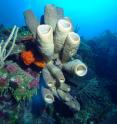Scientists call for new strategy to study climate change impacts on coral reefs
An international research team calls for a targeted research strategy to better understand the impact multiple stressors will have on coral reef in the future due to global climate change. The scientists published their new approach to coral reef research in the journal Frontiers in Marine Science. The researchers conducted a literature review to evaluate recent research on the ecological health impacts of corals when exposed to more than one stressor, such as increased ocean temperature and increased ocean acidification.
More than just bleaching and a loss of calcium shells, changes in temperature and ocean acidification - driven by increased CO2 in the atmosphere - can cause corals to grow more slowly and can inhibit reproduction, according to the researchers. The researchers suggest that when stresses occur simultaneously, they have dangerous effects on corals that are not anticipated by studies that only evaluate a single stressor to corals.
"The evidence is stacking up that the interaction of multiple stressors and ecological complexity may mean that negative effects on coral reefs will happen sooner, and be more severe than previously thought," said Chris Langdon, a professor of marine biology and ecology and co-author of the study. "In order to answer the challenge to produce more accurate predictions, coral reef scientists will need to scale-up their studies to better encompass the complexity of natural systems."
The researchers call for a new focus on coral reef research that combines traditional laboratory experiments with more realistic field-based experiments that attempt to mimic the types of changes in multiple stressors that are expected to impact corals in the future.
"Because the species that make up coral reefs differ from region to region, we need a global strategy for choosing where to locate these larger, field-based experiments, called mesocosm studies, to better inform adaptation and environmental policy that are regionally appropriate," the researchers said.
Source: University of Miami Rosenstiel School of Marine & Atmospheric Science
Articles on the same topic
- Marine reserves are critical for coral reef resilienceThu, 7 Apr 2016, 14:39:51 UTC
- Current methods cannot predict damage to coral reefsWed, 6 Apr 2016, 16:33:56 UTC
- New database gives scientists hope for helping coral reefsWed, 6 Apr 2016, 14:02:59 UTC
- Coral reefs highlight the key role of existing biodiversity for climate change adaptationTue, 5 Apr 2016, 2:14:24 UTC
- Fishing for the future of coral reefsTue, 5 Apr 2016, 2:14:17 UTC
Other sources
- Scientists seek genetic reasons for coral reef survivalfrom PhysorgThu, 7 Apr 2016, 14:31:21 UTC
- Marine reserves are critical for coral reef resiliencefrom PhysorgThu, 7 Apr 2016, 14:31:17 UTC
- New database gives scientists hope for helping coral reefsfrom Science DailyThu, 7 Apr 2016, 1:40:41 UTC
- Global warming, El Nino leave 36 per cent of coral reefs on death watchfrom CBC: Technology & ScienceWed, 6 Apr 2016, 20:20:34 UTC
- Corals struggle to grow under multiple stressorsfrom Science DailyWed, 6 Apr 2016, 19:00:39 UTC
- Researchers show corals struggle to grow under multiple stressorsfrom PhysorgWed, 6 Apr 2016, 17:40:45 UTC
- New database gives scientists hope for helping coral reefsfrom PhysorgWed, 6 Apr 2016, 14:40:47 UTC
- Fishing for the future of coral reefsfrom Science DailyTue, 5 Apr 2016, 2:10:44 UTC
- Coral reefs highlight the key role of existing biodiversity for climate change adaptationfrom Science DailyMon, 4 Apr 2016, 20:30:38 UTC
- Coral Reefs Highlight the Key Role of Existing Biodiversity for Climate Change Adaptationfrom Newswise - ScinewsMon, 4 Apr 2016, 20:01:09 UTC
- Coral reefs highlight the key role of existing biodiversity for climate change adaptationfrom PhysorgMon, 4 Apr 2016, 19:00:42 UTC
- Fishing for the future of coral reefsfrom PhysorgMon, 4 Apr 2016, 19:00:41 UTC
- Great Barrier Reef Coral Bleaching is 'Worst in its History'from Live ScienceFri, 1 Apr 2016, 20:00:52 UTC
- Worst Coral Reef Bleaching Yet Seen | Aerial Videofrom Live ScienceFri, 1 Apr 2016, 18:00:40 UTC
- [In Depth] El Niño's warmth devastating reefs worldwidefrom Science NOWThu, 31 Mar 2016, 18:40:38 UTC
- VIDEO: Is coral bleaching getting worse?from BBC News: Science & NatureTue, 29 Mar 2016, 16:00:49 UTC
- Northern Great Barrier Reef experiences worst coral bleaching everfrom CBC: Technology & ScienceTue, 29 Mar 2016, 15:00:42 UTC
- Barrier Reef hit by 'worst' bleachingfrom BBC News: Science & NatureTue, 29 Mar 2016, 8:30:41 UTC
- Worst bleaching on record for Great Barrier Reef: scientistsfrom PhysorgTue, 29 Mar 2016, 7:01:57 UTC
- Great Barrier Reef coral bleaching hits "extreme level"from CBSNews - ScienceMon, 28 Mar 2016, 20:20:43 UTC
- Scientists call for new strategy to study climate change impacts on coral reefsfrom Science DailyMon, 28 Mar 2016, 15:21:06 UTC
- Scientists call for new strategy to study climate change impacts on coral reefsfrom PhysorgMon, 28 Mar 2016, 14:50:43 UTC
